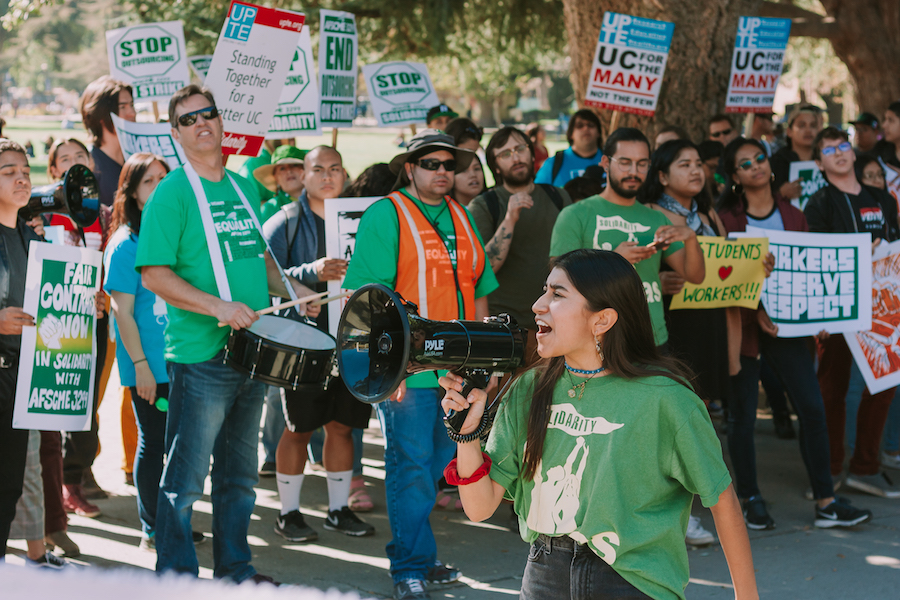
Three-day strike prompts class cancellation, relocation across departments
A three-day strike took place in late October across the University of California system on behalf of American Federation of State, County and Municipal Employees 3299, the UC’s largest employee union. While professors and teaching assistants are not included in this union, a number of them altered their schedules around the strike.
Workers participated in the strike to address issues such as healthcare premium increases, flattening wages, risky 401(k) plans and the outsourcing of jobs within the UC system.
Several classes, discussion sections and even office hours were cancelled or moved to a alternate locations off-campus while other professors held tight to their strict 10-week plans and continued lecturing.
Though the professors and teaching assistants who cancelled or relocated classes don’t belong to the union, changing their schedules was a show of support for fellow colleagues who feel they are not being given what they deserve. Po-Chun Huang, a Ph.D. candidate in the Department of Sociology, discussed his reasoning for cancelling his classes.
“I simply want to support the union that is working hard on negotiating a fair contract for all the UC workers who provide services to support our teaching and research functions,” Huang said.
A look at his syllabus shows that a midterm was scheduled for the following week after the strike. When asked whether or not this will affect students’ performance, Huang replied that he did not anticipate any consequences and was able to effectively combine two lectures into one.
Other classes were made optional including Dr. Scott Shershaw’s clerical theory course. The English professor sent out an announcement that any student who did not want to cross the picket line would be excused, and students who did attend lecture were taught about strikes and labor unions. Coincidentally, the lecture topic for that Wednesday was the relationship between labor and education.
“I feel strongly about balancing my support for the strike and not wanting to cross the picket line, while also keeping my obligations to the students,” Shershaw said in regard to his explanation for the decision.
He also said that he felt that the strike should not hinder students’ opportunities to learn but instead teach them something.
Some other professors chose to get creative, and many found ways to hold class without setting foot on campus and crossing the picket line. This included Dr. Eva Mroczek, a professor in the Department of Religious Studies. Mroczek opted to hold class in Central Park and did not go onto campus during the strike.
“While I am fortunate to have good benefits and job security, that doesn’t go for everyone who works here, and we’re all in this together,” Mroczek said. “Knowing if the people who take care of our health, maintain our campus and make our food every day are being treated fairly definitely affects our ability to learn and teach.”
She reported that students were relieved that they did not have to choose between supporting workers and attending class, and nearly everyone was present at the session in the park. Mroczek also felt that the reason behind the strike impacted the students ability to learn.
Students had a variety of reactions to the altered schedule during the week of the strike. Several students were grateful for the cancellation, because it allowed them more time to study and slowed the quarter-system pace down.
Second-year animal science major Bianca Burkhart said that the cancellation of her three-hour chemistry lab came as a relief.
“We will be cutting the class one lab short and not making it up,” Burkhart said. “It took a lot of stress off of my plate, and as for the material we missed, we will just be learning about it in lecture and not acting on it in lab.”
While some students were glad their professors cancelled classes, others were relieved when their schedules remained unchanged. No two classes are the same, and while some courses have room for one or two missed sessions, others are on stricter schedule and instructors are unable to drop a whole lecture from the syllabus.
“I’m honestly grateful that my sections weren’t cancelled or moved, because that would’ve led to a lot of unwanted stress for me,” said fourth-year managerial economics major Ryan Donat. “I understand wanting to respect the strike and not cross the picket line, but I also think that my main priority at Davis is to learn and I need the help of my TA’s and professors to do so.”
Written by: Claire Dodd — campus@theaggie.org



